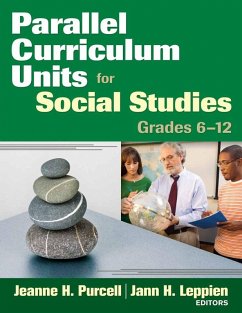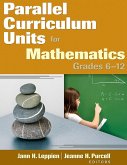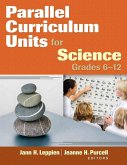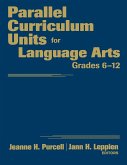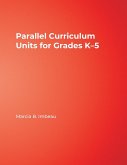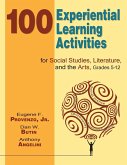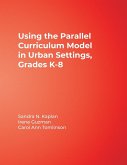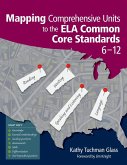- Broschiertes Buch
- Merkliste
- Auf die Merkliste
- Bewerten Bewerten
- Teilen
- Produkt teilen
- Produkterinnerung
- Produkterinnerung
Covering history, geography, and sociology, these sample lessons and units show how to use the Parallel Curriculum Model to provide rigorous learning opportunities for students in social studies.
Andere Kunden interessierten sich auch für
![Parallel Curriculum Units for Mathematics, Grades 6-12 Parallel Curriculum Units for Mathematics, Grades 6-12]() Jann H. LeppienParallel Curriculum Units for Mathematics, Grades 6-1233,99 €
Jann H. LeppienParallel Curriculum Units for Mathematics, Grades 6-1233,99 €![Parallel Curriculum Units for Science, Grades 6-12 Parallel Curriculum Units for Science, Grades 6-12]() Jann H. LeppienParallel Curriculum Units for Science, Grades 6-1243,99 €
Jann H. LeppienParallel Curriculum Units for Science, Grades 6-1243,99 €![Parallel Curriculum Units for Language Arts, Grades 6-12 Parallel Curriculum Units for Language Arts, Grades 6-12]() Jeanne H. PurcellParallel Curriculum Units for Language Arts, Grades 6-1243,99 €
Jeanne H. PurcellParallel Curriculum Units for Language Arts, Grades 6-1243,99 €![Parallel Curriculum Units for Grades K-5 Parallel Curriculum Units for Grades K-5]() Marcia B. ImbeauParallel Curriculum Units for Grades K-546,99 €
Marcia B. ImbeauParallel Curriculum Units for Grades K-546,99 €![100 Experiential Learning Activities for Social Studies, Literature, and the Arts, Grades 5-12 100 Experiential Learning Activities for Social Studies, Literature, and the Arts, Grades 5-12]() Eugene F. Provenzo Jr.100 Experiential Learning Activities for Social Studies, Literature, and the Arts, Grades 5-1239,99 €
Eugene F. Provenzo Jr.100 Experiential Learning Activities for Social Studies, Literature, and the Arts, Grades 5-1239,99 €![Using the Parallel Curriculum Model in Urban Settings, Grades K-8 Using the Parallel Curriculum Model in Urban Settings, Grades K-8]() Sandra N. KaplanUsing the Parallel Curriculum Model in Urban Settings, Grades K-846,99 €
Sandra N. KaplanUsing the Parallel Curriculum Model in Urban Settings, Grades K-846,99 €![Mapping Comprehensive Units to the ELA Common Core Standards, 6-12 Mapping Comprehensive Units to the ELA Common Core Standards, 6-12]() Kathy Tuchman GlassMapping Comprehensive Units to the ELA Common Core Standards, 6-1243,99 €
Kathy Tuchman GlassMapping Comprehensive Units to the ELA Common Core Standards, 6-1243,99 €-
-
-
Covering history, geography, and sociology, these sample lessons and units show how to use the Parallel Curriculum Model to provide rigorous learning opportunities for students in social studies.
Hinweis: Dieser Artikel kann nur an eine deutsche Lieferadresse ausgeliefert werden.
Hinweis: Dieser Artikel kann nur an eine deutsche Lieferadresse ausgeliefert werden.
Produktdetails
- Produktdetails
- Verlag: Corwin
- Seitenzahl: 240
- Erscheinungstermin: 29. Oktober 2009
- Englisch
- Abmessung: 280mm x 216mm x 13mm
- Gewicht: 615g
- ISBN-13: 9781412965408
- ISBN-10: 1412965403
- Artikelnr.: 27942636
- Herstellerkennzeichnung
- Libri GmbH
- Europaallee 1
- 36244 Bad Hersfeld
- gpsr@libri.de
- Verlag: Corwin
- Seitenzahl: 240
- Erscheinungstermin: 29. Oktober 2009
- Englisch
- Abmessung: 280mm x 216mm x 13mm
- Gewicht: 615g
- ISBN-13: 9781412965408
- ISBN-10: 1412965403
- Artikelnr.: 27942636
- Herstellerkennzeichnung
- Libri GmbH
- Europaallee 1
- 36244 Bad Hersfeld
- gpsr@libri.de
Jeanne H. Purcell is the consultant to the Connecticut State Department of Education for gifted and talented education. She is also director of UConn Mentor Connection, a nationally recognized summer mentorship program for talented teenagers that is part of the NEAG Center for Talent Development at the University of Connecticut. Prior to her work at the State Department of Connecticut, she was an administrator for Rocky Hill Public Schools (CT); a program specialist with the National Research Center on the Gifted and Talented, where she worked collaboratively with other researchers on national issues related to high-achieving young people; an instructor of Teaching the Talented, a graduate-level program in gifted education; and a staff developer to school districts across the country and Canada. She has been an English teacher, community service coordinator, and teacher of the gifted, K-12, for 18 years in Connecticut school districts and has published many articles that have appeared in Educational Leadership, Gifted Child Quarterly, Roeper Review, Educational and Psychological Measurement, National Association of Secondary School Principals' Bulletin, Our Children: The National PTA Magazine, Parenting for High Potential, and Journal for the Education of the Gifted. She is active in the National Association for Gifted Children (NAGC) and serves on the Awards Committee and the Curriculum Committee of NAGC, for which she is the co-chair for the annual Curriculum Awards Competition.
About the Editors
About the Contributors
Introduction: A Brief History of the Parallel Curriculum Model (PCM)
1. Becoming a Geographer (Grade 6) - Heather Burke
Background Information
Content Framework
Unit Assessments
Overview of the Unit
Lesson 1: Climate and Seasons
Lesson 2: Investigating World Populations
Lesson 3: Shop Around the Globe
Lesson 4: The Culture of Geography
2. Through the Looking Glass: A Unit for Reading/Writing/Social Studies
Intervention Classes (Middle School) - Dawn Vier, Lisa L. Ward
Introduction to the Unit
Content Framework
Unit Assessments
Background Information
Unit Sequence, Description, and Teacher Reflections
Lesson 1: Introduction?"Who Am I?"
Lesson 2: The Pursuit of Happiness
Lesson 3: Authentic Authors
Lesson 4: Sociocentrism
Lesson 5: The City
Lesson 6: The Great Depression
Lesson 7: A Sign of the Times
Lesson 8: Persuade Me!
Lesson 9: Planet Earth
3. Subversion and Controversy: Sociological Considerations of Humor, a
Cross-Curricular Unit in Sociology and Literature (Grades 7 and 8) - Kelly
M. Dausel
Background Information
Content Framework
Guiding Questions for Each Parallel
Unit Assessments
Overview of the Unit
Unit Sequence, Description, and Teacher Reflections
Lesson 1: Introduction to Sociology and How Sociologists Think
Lesson 2: Humor in Society
Lesson 3: Humor in Communication
Lesson 4: Sociological Research
Lesson 5: Curriculum of Identity Creative Extension
4. True Story-Telling: How Historians Construct the Past, Grade 10 -
Catherine Little
Background Information
Content Framework
Unit Assessments
Overview of Key Lesson Ideas/Purposes
Lesson 1: Selective Memory
Lesson 2: Constructing History
Lesson 3: The Past Through Many Eyes
Lesson 4: Who Writes History?
Lesson 5: What Makes the History Books?
Resources
Index
About the Contributors
Introduction: A Brief History of the Parallel Curriculum Model (PCM)
1. Becoming a Geographer (Grade 6) - Heather Burke
Background Information
Content Framework
Unit Assessments
Overview of the Unit
Lesson 1: Climate and Seasons
Lesson 2: Investigating World Populations
Lesson 3: Shop Around the Globe
Lesson 4: The Culture of Geography
2. Through the Looking Glass: A Unit for Reading/Writing/Social Studies
Intervention Classes (Middle School) - Dawn Vier, Lisa L. Ward
Introduction to the Unit
Content Framework
Unit Assessments
Background Information
Unit Sequence, Description, and Teacher Reflections
Lesson 1: Introduction?"Who Am I?"
Lesson 2: The Pursuit of Happiness
Lesson 3: Authentic Authors
Lesson 4: Sociocentrism
Lesson 5: The City
Lesson 6: The Great Depression
Lesson 7: A Sign of the Times
Lesson 8: Persuade Me!
Lesson 9: Planet Earth
3. Subversion and Controversy: Sociological Considerations of Humor, a
Cross-Curricular Unit in Sociology and Literature (Grades 7 and 8) - Kelly
M. Dausel
Background Information
Content Framework
Guiding Questions for Each Parallel
Unit Assessments
Overview of the Unit
Unit Sequence, Description, and Teacher Reflections
Lesson 1: Introduction to Sociology and How Sociologists Think
Lesson 2: Humor in Society
Lesson 3: Humor in Communication
Lesson 4: Sociological Research
Lesson 5: Curriculum of Identity Creative Extension
4. True Story-Telling: How Historians Construct the Past, Grade 10 -
Catherine Little
Background Information
Content Framework
Unit Assessments
Overview of Key Lesson Ideas/Purposes
Lesson 1: Selective Memory
Lesson 2: Constructing History
Lesson 3: The Past Through Many Eyes
Lesson 4: Who Writes History?
Lesson 5: What Makes the History Books?
Resources
Index
About the Editors
About the Contributors
Introduction: A Brief History of the Parallel Curriculum Model (PCM)
1. Becoming a Geographer (Grade 6) - Heather Burke
Background Information
Content Framework
Unit Assessments
Overview of the Unit
Lesson 1: Climate and Seasons
Lesson 2: Investigating World Populations
Lesson 3: Shop Around the Globe
Lesson 4: The Culture of Geography
2. Through the Looking Glass: A Unit for Reading/Writing/Social Studies
Intervention Classes (Middle School) - Dawn Vier, Lisa L. Ward
Introduction to the Unit
Content Framework
Unit Assessments
Background Information
Unit Sequence, Description, and Teacher Reflections
Lesson 1: Introduction?"Who Am I?"
Lesson 2: The Pursuit of Happiness
Lesson 3: Authentic Authors
Lesson 4: Sociocentrism
Lesson 5: The City
Lesson 6: The Great Depression
Lesson 7: A Sign of the Times
Lesson 8: Persuade Me!
Lesson 9: Planet Earth
3. Subversion and Controversy: Sociological Considerations of Humor, a
Cross-Curricular Unit in Sociology and Literature (Grades 7 and 8) - Kelly
M. Dausel
Background Information
Content Framework
Guiding Questions for Each Parallel
Unit Assessments
Overview of the Unit
Unit Sequence, Description, and Teacher Reflections
Lesson 1: Introduction to Sociology and How Sociologists Think
Lesson 2: Humor in Society
Lesson 3: Humor in Communication
Lesson 4: Sociological Research
Lesson 5: Curriculum of Identity Creative Extension
4. True Story-Telling: How Historians Construct the Past, Grade 10 -
Catherine Little
Background Information
Content Framework
Unit Assessments
Overview of Key Lesson Ideas/Purposes
Lesson 1: Selective Memory
Lesson 2: Constructing History
Lesson 3: The Past Through Many Eyes
Lesson 4: Who Writes History?
Lesson 5: What Makes the History Books?
Resources
Index
About the Contributors
Introduction: A Brief History of the Parallel Curriculum Model (PCM)
1. Becoming a Geographer (Grade 6) - Heather Burke
Background Information
Content Framework
Unit Assessments
Overview of the Unit
Lesson 1: Climate and Seasons
Lesson 2: Investigating World Populations
Lesson 3: Shop Around the Globe
Lesson 4: The Culture of Geography
2. Through the Looking Glass: A Unit for Reading/Writing/Social Studies
Intervention Classes (Middle School) - Dawn Vier, Lisa L. Ward
Introduction to the Unit
Content Framework
Unit Assessments
Background Information
Unit Sequence, Description, and Teacher Reflections
Lesson 1: Introduction?"Who Am I?"
Lesson 2: The Pursuit of Happiness
Lesson 3: Authentic Authors
Lesson 4: Sociocentrism
Lesson 5: The City
Lesson 6: The Great Depression
Lesson 7: A Sign of the Times
Lesson 8: Persuade Me!
Lesson 9: Planet Earth
3. Subversion and Controversy: Sociological Considerations of Humor, a
Cross-Curricular Unit in Sociology and Literature (Grades 7 and 8) - Kelly
M. Dausel
Background Information
Content Framework
Guiding Questions for Each Parallel
Unit Assessments
Overview of the Unit
Unit Sequence, Description, and Teacher Reflections
Lesson 1: Introduction to Sociology and How Sociologists Think
Lesson 2: Humor in Society
Lesson 3: Humor in Communication
Lesson 4: Sociological Research
Lesson 5: Curriculum of Identity Creative Extension
4. True Story-Telling: How Historians Construct the Past, Grade 10 -
Catherine Little
Background Information
Content Framework
Unit Assessments
Overview of Key Lesson Ideas/Purposes
Lesson 1: Selective Memory
Lesson 2: Constructing History
Lesson 3: The Past Through Many Eyes
Lesson 4: Who Writes History?
Lesson 5: What Makes the History Books?
Resources
Index

